Dmitri Pokrovsky
Dmitri Viktorovich Pokrovsky (Russian: Дмитрий Викторович Покровский, 3 May 1944 – 29 June 1996) was a Russian folk music researcher and musician best known for his efforts to rediscover authentic and often near extinct rural musical traditions from many different regions of Russia and re-enacting them with the Dmitri Pokrovsky Ensemble.
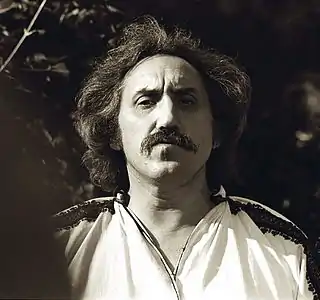
Biography
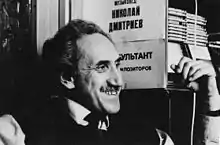
In the early 1970s, Dmitri Pokrovsky was a student of conducting at Moscow’s Gnessin Pedagogical Institute of Music, from which he graduated in 1972.[1] Frustrated with the then manner of interpretation of Russian folk music, he developed a new approach to its performance which went against the established patterns and rules. His inspiration came after hearing a performance in a remote village in Russia, which embedded within the oldest of traditions. In the sound made by a group of old women singing, Pokrovsky heard songs passed down from generation to generation for thousands of years. These songs were extraordinary, complicated, dense in form, and the performance style was unknown in towns and cities. These were the authentic performance style of traditional Russian folk songs.
.jpg.webp)
Pokrovsky set out imitating this traditional style with a goal was to preserve and transmit it to a new generation of performers and audiences. Dmitri was one of the first musicians in Russia who undertook to bridge the gap between the old and new musical vocabulary
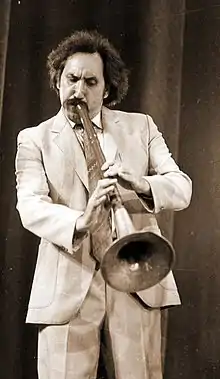
Pokrovsky has lectured at America’s Smithsonian Institution, Princeton University and the Omega Institute, and was a Visiting Professor at Dartmouth College, USA. Directing his Ensemble, Pokrovsky wrote numerous scores for films and was an active musical director in Russian theatre. In 1988, Mikhail Gorbachev honoured Pokrovsky with the Government Award, the Soviet Union’s highest recognition for artistic excellence, a testament to the scholarship, musicianship and vitality with which he and the Ensemble had preserved Russian tradition, culture and customs.
In 1996 he died aged 52 from aortic rupture.[2]
Education
- 1978-1980 - All Union Institute of the History of Art; Moscow, USSR. Graduate work in musicology. Principal teacher: Evgenny V. Hippias.
- 1967-1972 - Russian Academy of Music (formerly the Gnessin Institute); Moscow USSR. Masters of Art in Orchestral Conducting and Traditional Folk Instruments. Principal Teachers: Conducting: Alexander Posdniakov, Orchestration: Serguei Gochekov, Piano: Berta Kremenstein
- 1966 - Private study in Orchestral Conducting with Boris Haikin
- 1961- 1965 - Musical College of the October Revolution : Bachelor of Arts in Orchestral Conducting and Performance Balalaika. Assistant of conductor in Vladimir Loktev Ensemble
Employment
1973 to 1996
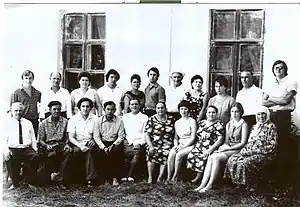
- Founder and Artistic Director of the Dmitri Pokrovsky Ensemble, a group of performers and ethnomusicologists dedicated to researching and recreating Russian village music, dance and rituals.
- 1992-1996 Visiting Professor; Dartmouth College, Hanover, New Hampshire. Music, Tradition and Cultural Politics in Russia.
- 1990-1991 Artistic Director; “Russian-American Christmas Revels”, San Francisco, Boston, Washington DC
- 1982-1990 Director; Folklore and Ethnographic Workshops of Moscow State University
- 1984 Guest Composer and Conductor; “Boris Godunov”, Taganka Theater, Moscow, Russia.
- 1978-1982 Guest Composer and Conductor for Original Scores; State Cinematographic Symphony, Moscow, Russia
- 1977 Guest Composer; Georgian Chamber Orchestra, Tbilisi, Georgia.
- 1972-1976 Professor; Russian Academy of Music, Moscow, Russia. Designed the Academy’s curriculum in traditional instruments.
- 1970-1975 Teacher; Musical College of the October Revolution, Moscow, Russia. Instrumentation and Conducting Techniques.
- 1965- 1970 Artistic Director; Balalaika Ensemble of the Moscow Philharmonic
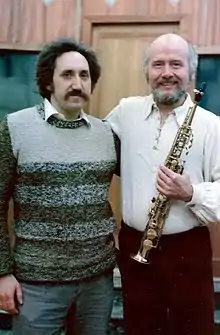 Dmitry Pokrovsky and Paul Winter
Dmitry Pokrovsky and Paul Winter
Honours
- USSR State Prize for Literature and Arts, 1988.
- President: UNESCO International Folklore Organization of Russia
- President: National Center for Traditional Culture of Russia
- Board Member: Soviet Cultural Foundation
- Government Medal for Work in the Arts
- Laureate:All Russian Vocal Ensemble Competition
Recordings
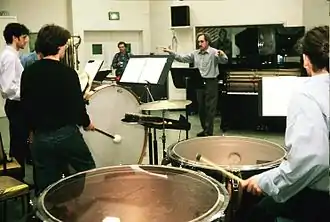
- 1994 “Les Noces”, Elektra\Nonesuch Records. Explorer Series 79335-2
- 1992 Guest appearance on “Us” by Peter Gabriel
- 1991 “Wild Field”, Virgin Records, RW 4-91736
- 1990 “Holy Evening”, Bally Bally Records, BB 1257
- 1990 “Faces of Russia”, Trikont Records and Bally Bally Records, BB 1265
- 1988 “Earthbeat”, Living Music Records, LM 45678
- 1978 “Russian Polyphony”, Melodia Records, FILM SCORES
- 1983 “Nature in Danger” for Felix Pasternack and The State Documentary Studio of the USSR
- 1981 “Delayed Sunrise”: for Alexander Muratov and The Ukrainian State Film Studio.
- 1980 “The Magic Pitcher” : for Vladimir Tarasov and The Screen Studio of Soviet TV
- 1979 “The Lark”:for Victor Novotsky and The Screen Studio of Soviet TV THEATRE MUSIC
- 1985 “Pushkin and Natalie”: Hermitage Theater, Moscow, Russia. Artistic Director : Kama Ginkas
- 1984 “Lord of the Flys”: Maly Dramatic Theater, Moscow, Russia. Artistic Director: Lev Dodin
- 1980 “Boris Godunov”: Taganka Theater, Moscow,Russia. Artistic Director: Yuri Lubimov
- 1980 “Funeral in California”: Mo\Soviet Theater, Moscow, Russia. Artistic Director: Sergei Yursky
- 1978 “Truth is Good but Happiness is Better”: Mos\Soviet Theater, Moscow, Russia. Artistic Director: Sergei Yursky
External links
- The Dmitri Pokrovsky Ensemble
- Orbituary: Kozinn, Allan (July 3, 1996), "Dmitri Pokrovsky, 52, Singer And Russian Ethnomusicologist", The New York Times
References
- "Archived copy". Archived from the original on 2011-01-07. Retrieved 2010-12-14.CS1 maint: archived copy as title (link)
- "Дмитрий Покровский". Crears. Archived from the original on 29 December 2011. Retrieved 31 July 2012.